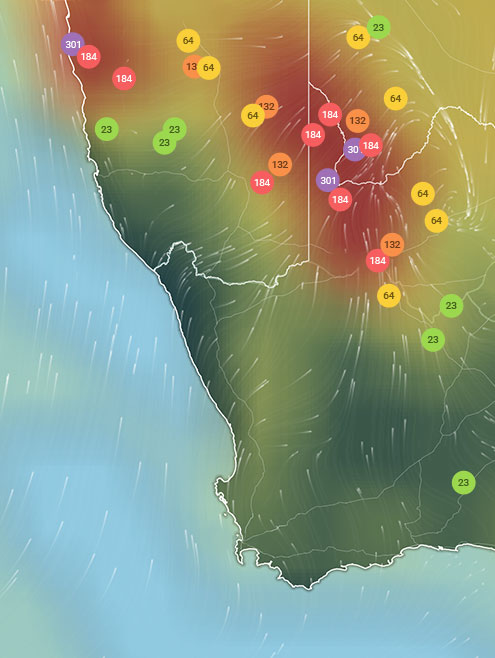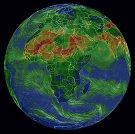Get a monitor and contributor to air quality data in your city.
96K people follow this city






AIR QUALITY DATA CONTRIBUTORS
Find out more about contributors and data sources| Weather | Clear sky |
| Temperature | 89.6°F |
| Humidity | 73% |
| Wind | 7.9 mp/h |
| Pressure | 29.6 Hg |
| # | city | US AQI |
|---|---|---|
| 1 | Doi Saket, Chiang Mai | 180 |
| 2 | Chiang Mai, Chiang Mai | 179 |
| 3 | San Sai, Chiang Mai | 179 |
| 4 | Mae On, Chiang Mai | 169 |
| 5 | Phetchabun, Phetchabun | 158 |
| 6 | Uttaradit, Uttaradit | 153 |
| 7 | Mae Mo, Lampang | 152 |
| 8 | Chiang Rai, Chiang Rai | 151 |
| 9 | Sam Phran, Nakhon Pathom | 135 |
| 10 | Hua Hin, Prachuap Khiri Khan | 127 |
(local time)
SEE WORLD AQI RANKING
| # | station | US AQI |
|---|---|---|
| 1 | Wat Thung Noi | 119 |
(local time)
SEE WORLD AQI RANKINGUS AQI
119
live AQI index
Unhealthy for sensitive groups
| Air pollution level | Air quality index | Main pollutant |
|---|---|---|
| Unhealthy for sensitive groups | 119 US AQI | PM2.5 |
| Pollutants | Concentration | |
|---|---|---|
| PM2.5 | 43µg/m³ | |
PM2.5
x8.6
PM2.5 concentration in Nakhon Chai Si is currently 8.6 times the WHO annual air quality guideline value
| Reduce outdoor exercise | |
| Close your windows to avoid dirty outdoor air GET A MONITOR | |
| Sensitive groups should wear a mask outdoors GET A MASK | |
| Run an air purifier GET AN AIR PURIFIER |
| Day | Pollution level | Weather | Temperature | Wind |
|---|---|---|---|---|
| Wednesday, Apr 17 | Moderate 83 AQI US | 100.4° 80.6° | ||
| Thursday, Apr 18 | Moderate 84 AQI US | 102.2° 82.4° | ||
| Friday, Apr 19 | Unhealthy for sensitive groups 127 AQI US | 104° 80.6° | ||
| Today | Unhealthy for sensitive groups 119 AQI US | 104° 80.6° | ||
| Sunday, Apr 21 | Moderate 76 AQI US | 102.2° 82.4° | ||
| Monday, Apr 22 | Moderate 75 AQI US | 104° 78.8° | ||
| Tuesday, Apr 23 | Moderate 76 AQI US | 104° 80.6° | ||
| Wednesday, Apr 24 | Moderate 70 AQI US | 104° 84.2° | ||
| Thursday, Apr 25 | Moderate 72 AQI US | 104° 84.2° | ||
| Friday, Apr 26 | Moderate 72 AQI US | 104° 80.6° |
Interested in hourly forecast? Get the app
Nakhon Chai Si is located in the central region of Thailand and has a somewhat different record of air pollution present when compared to other cities, towns and provinces in Thailand. Whilst the northern region of the country is subject to much higher incidences of air pollution due to the open burning of farmland and forested areas, in a practice known as slash and burn farming, southern or central regions do not get affected as badly by this phenomenon. Variations can, however, exist depending on the nature of each area and cities that aren’t so far north may also see spikes in its pollution levels due to this occurrence. Nakhon Chai Si does not have any particular prominent spikes in its air pollution levels throughout the year, utilizing the data collected for 2020 as a reference point. The end of the article will discuss which months of the year are more polluted than others, and which ones have the best level of air quality. In mid to late October of 2021, a US AQI reading of 70 was recorded, a fairly high figure that placed Nakhon Chai Si into the 'moderate' air pollution rating bracket, which requires a US AQI reading of 51 to 100 to be classified as such. it is typically around this time of year when air quality levels start to worsen, and as such preventative measures should be put into place to halt or lessen the adverse health effects.
Air pollution has a prevalence in Nakhon Chai Si due to many of the reasons that afflict other cities, towns and regions throughout Thailand as well as neighboring countries. These include ones such as the burning of vast swathes of forest or farmland, conducted in a practice known as slash and burn farming. Whilst this is most prevalent in the northern regions of the country, it can also affect many other provinces, causing the pollution levels to spike drastically towards the end of the year and stay elevated into the early months of the following year, with some cited figures from years past demonstrating this, which will be discussed in the last two questions of the article. Other causes of air pollution in Nakhon Chai Si include exhaust fumes emitted from the numerous vehicles in use, with a large amount of them being of the aged or defunct variety. Whilst there have been many steps taken to remove those excess pollution-causing vehicles from the roads, particularly in major cities, their use is still prevalent throughout many rural areas or outside the larger or more densely populated regions. Due to the extremely poor combustion process that takes place (often coupled with low-quality fuels or fossil fuels), considerably higher amounts of noxious oil vapors are released into the atmosphere, along with the usual chemical compounds such as nitrogen dioxide, sulfur dioxide, carbon monoxide, ozone (which forms afterward as the various pollutants are exposed to solar radiation, thus forcing a reaction take place which forms ozone, or smog as it is more commonly known as). Other causes include factories and power plants, which also rely heavily on burning fossil fuels to meet their power needs. Road repairs, construction sites and other similar areas also release high amounts of ultrafine or coarse particles into the air, raising the PM2.5 and PM10 levels, which can cause prominent spikes in the particle pollution readings. The combustion of raw and organic materials remains as one of the more prevalent causes of pollution in Nakhon Chai Si, compounded further by anthropogenic and industrial activities.
Excessive breathing of polluted air during certain months can bring about a myriad of health issues, with some being more short-term and less severe in nature, whilst others can have more serious and long-lasting effects, sometimes contributing to an earlier mortality rate. Dry coughs, respiratory infections and irritation to the respiratory tract are common, typically when inhalation of fine particles occurs. This can be lessened by wearing particle filtering masks during bouts of higher air pollution, as well as avoiding outdoor activity. Other health issues include chronic obstructive pulmonary disease (COPD), an umbrella term that includes within it ailments such as pneumonia, bronchitis, aggravated forms of asthma (which can be caused, as well as triggered off by exposure to fine dust particles and certain chemical irritants) and emphysema, all of which can decrease an individuals capacity to take a full breath of air, reduce the quality of living as well as contribute to premature death rates, particularly when such conditions go untreated or exposure to pollution is not well managed.
The main pollutants that are referenced are those that go into making up the US AQI aggregate, which is calculated by the volume of these pollutants and their prevalence in the atmosphere. These include chemical compounds such as nitrogen dioxide, sulfur dioxide, ozone, carbon monoxide and the two main forms of particle pollution, PM2.5 and PM10. From both of these, PM2.5 remains as the more dangerous of the two, being comprised of any material that is 2.5 micrometers or less in diameter (with these particles ranging from several extremely dangerous materials such as metals, bacteria and mold spores, nitrates, sulfates and a variety of liquid-vapor droplets, along with ultrafine dust, which can cause scarring to the lung tissue when inhaled along with some of them being carcinogenic). Other pollutants found in the air are ones such as black carbon and volatile organic compounds (VOCs), both of which are released prominently by the combustion of organic material as well as fossil fuels. Some examples of VOCs are benzene, which is known to be highly carcinogenic, as well as styrene, methylene chloride, toluene, xylene and formaldehyde. VOCs can also make up a large portion of indoor air pollution levels, with many household items (particularly toiletries) releasing them steadily into the air. Air fresheners, paints, glues and varnishes can all release them, along with other innocuous items such as scented candles.
Observing the air quality data collected from 2020, it can be seen that Nakhon Chai Si had its highest levels of PM2.5 in March and April, as well as November and December, with October being the month where it became apparent that the PM2.5 levels were beginning to rise. Out of all these months, November and December had the highest readings coming in at 28.1 μg/m³ and 34.4 μg/m³ respectively.
Nakhon Chai Si had a much improved period in which the PM2.5 numbers fell within the World Health Organization's (WHO's) target goal of 10 μg/m³ or less, for the more optimal level of air quality. June through to September (a typical scenario seen though much of Thailand) had the best air quality readings, coming in at 6.8 μg/m³, 7.5 μg/m³, 8.4 μg/m³ and 8 μg/m³ respectively.
1Contributor
Individual Contributor
1 station
1 Data source